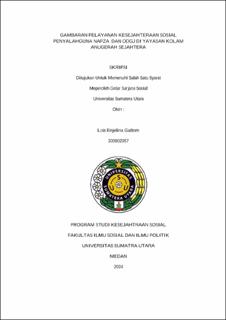| dc.description.abstract | This study aims to describe social welfare services for NAPZA abusers
and ODGJ at the Kolam Anugerah Sejahtera Foundation. This study uses a
descriptive qualitative approach as explained by Sugiyono, which aims to
describe the phenomena in the field in detail based on data collected from
research subjects. Based on the results of the study, the Kolam Anugerah
Sejahtera Foundation implements a simple but effective social welfare service
system, with easy resident admission procedures and recovery support facilities.
All NAPZA and ODGJ residents at this foundation come through family referrals
without the involvement of social services, addiction counselors, or other social
organizations.
The foundation provides freedom for families to visit residents at any time,
and to carry out ongoing monitoring after the resident returns home. The facilities
provided, such as worship services, nutritious food, and freedom in daily
activities, create an environment that supports the holistic welfare of residents.
The foundation successfully meets the material, spiritual, and social needs of
residents, although the freedom of interaction between residents without guidance
can pose a risk of conflict.
In handling ODGJ, the foundation uses a routine-based approach and
emotional support, which helps create stability for residents. However, the lack of
formal therapy such as psychological and medical shows that there is room for
improvement, especially for residents with severe mental disorders. For NAPZA
abusers, the foundation applies a holistic approach that includes physical, mental,
and social aspects, with full support from staff. Strong coordination among staff
ensures consistency in the method of handling NAPZA residents, especially for
heroin and morphine users. Overall, the Kolam Anugerah Sejahtera Foundation shows a strong commitment to providing comprehensive services, although there
is still room for improvement in the aspect of formal therapy. | en_US |


